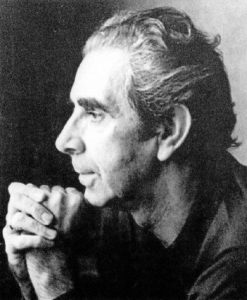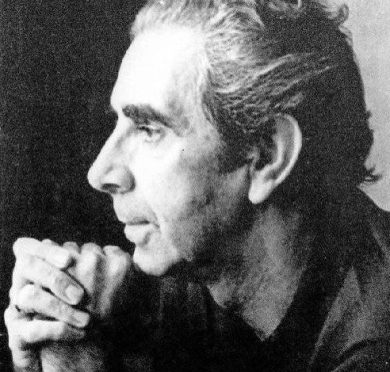It is sometimes amazing that, despite the long history of the Basque language, we know so little about it. Since it wasn’t a written language for so long and other languages like French and Spanish dominated the regions, Basque didn’t receive much attention from scholars. At least, not until relatively recently. It was people like Koldo Mitxelena who turned things around, who not only studied the language, but made it a subject worthy of pursuit. Larry Trask called Mitxelena “the greatest scholar the Basque language has ever seen.”

- Koldo (Luis in Spanish) Mitxelena Elissalt was born in 1915 in Errenteria, Gipuzkoa. He came from a modest background – his father was a basket maker and his maternal grandfather a weaver. As a child, he was bed-ridden due to illness for an extended time and it was during this period that he developed his passion for the Basque language.
- During the Spanish Civil War, he fought on the side of the anti-Fascists, joining the Euzko Gudarostea, or Basque army. He was captured and sentenced to death, but his sentence was commuted to 30 years in prison. In the end, he was released about five years later. However, during his time in prison he met several intellectuals and was encouraged to study at the university, which he did in 1948.
- Before that, he took an accounting job in Madrid where he was recruited by the Basque Government Resistance and worked clandestinely against Franco’s government with the hope that, if the Allies won World War II, Franco’s government would fall. For a time he led the Madrid cell. He was arrested during a raid and spent two more years in prison. In 1949 he married Matilde Martínez de Ilárduya, one of his co-conspirators in Madrid.
- In the 1950s, Mitxelena undertook the reconstruction of prehistorical Proto-Basque. Proto-Basque is what the Basque language looked like about 2000 years ago, right before and after the Basques first had contact with the Romans. By comparing how words vary in modern dialects of Basque and how loan words from Latin had evolved in the Basque language, he was able to go back in time, undoing those changes, to deduce what Basque must have been like back then.
- After he published his reconstruction of Proto-Basque, texts in Aquitanian were found which agreed with his reconstructions. This also established Aquitanian as an ancestral form of Basque, a conclusion he demonstrated in 1954.
- Mitxelena’s stature as the preeminent Basque linguist lead him to be asked, in 1968, to helm efforts to create Batua, the unified Basque dialect. He was also involved in the creation of the University of the Basque Country.
- Mitxelena died in 1987. A collection of his works, more than 6000 documents, can be found at the Koldo Mitxelena Kulturunea.
A full list of all of Buber’s Basque Facts of the Week can be found in the Archive.
Primary sources: Koldo Mitxelena, Wikipedia; Estornés Zubizarreta, Idoia. Mitxelena Elissalt, Koldo. Auñamendi Encyclopedia, 2024. Available at: https://aunamendi.eusko-ikaskuntza.eus/en/mitxelena-elissalt-koldo/ar-79333/
Discover more from Buber's Basque Page
Subscribe to get the latest posts sent to your email.



Blas,
This is not related to the above story. The Korikka has just been run. It is an interesting event and is worthy of a write-up.
Dutch
Excellent idea, thanks Dutch!
I was born two hundred meters from the house where Koldo Mitxelena was born.
The only thing I can say is that he did an incredible job in favor of the Basque language.